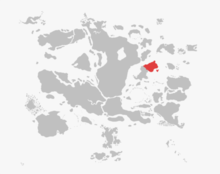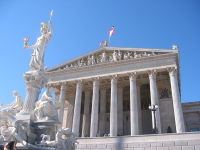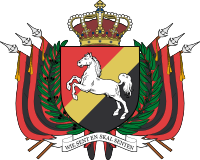Difference between revisions of "Nation/Soltsteed"
| Line 78: | Line 78: | ||
|nstracker = | |nstracker = | ||
}} | }} | ||
| − | '''Soltsteed''' ({{IPAc-en|s|ɔː|l|t|'|s|t|iː|d}}; {{small|locally}} {{IPAc-en|s|ɒ|l|ʔ|'|s|t|iː|ʔ}}; {{small|[[Soltsteedish language|Soltsteedish]] pronunciation:}} {{wp|International Phonetic Alphabet|/sʌlʔsteːt/}}), officially the '''Soltsteedish Commonwealth''', is a {{wp|Unitary state|unitary}} {{wp|parliamentary system|parliamentary}} {{wp|constitutional monarchy}} located on the eastern end of the {{region|Atlantian Oceania}} | + | '''Soltsteed''' ({{IPAc-en|s|ɔː|l|t|'|s|t|iː|d}}; {{small|locally}} {{IPAc-en|s|ɒ|l|ʔ|'|s|t|iː|ʔ}}; {{small|[[Soltsteedish language|Soltsteedish]] pronunciation:}} {{wp|International Phonetic Alphabet|/sʌlʔsteːt/}}), officially the '''Soltsteedish Commonwealth''', is a {{wp|Unitary state|unitary}} {{wp|parliamentary system|parliamentary}} {{wp|constitutional monarchy}} located on the north-eastern end of the landmass of [[Cyanea]] in {{region|Atlantian Oceania}}. |
==Etymology== | ==Etymology== | ||
| Line 95: | Line 95: | ||
==Politics== | ==Politics== | ||
{{main|Politics of Soltsteed|Elections in Soltsteed|List of political parties in Soltsteed}} | {{main|Politics of Soltsteed|Elections in Soltsteed|List of political parties in Soltsteed}} | ||
| − | Soltsteed is | + | Soltsteed is governed as a {{wp|democracy|democratic}}, {{wp|parliamentary system|parliamentary}} {{wp|constitutional monarchy}} with {{wp|universal suffrage}}. The Soltsteedish political system operates within the bounds of and derives its legitimacy from the ''[[Constitution of Soltsteed|1947 Constitution]]'', which regulates the powers of state institutions and the relationship between the state and the people; it is founded on the principles of {{wp|responsible government}}, {{wp|judicial independence}} and the {{wp|rule of law}} and guarantees fundamental and universal human rights that cannot be infringed upon by the state. |
| + | |||
| + | The [[Monarchy of Soltsteed|Reigning King]] (''de sittänne Köning''), currently [[William Thomas of the Soltsteedish|William Thomas]], is the ceremonial {{wp|head of state}} of Soltsteed, acting as "the symbol of the Commonwealth and of the unity of the people"; unusually, the Soltsteedish monarchy is a {{wp|popular monarchy}} in which the holder’s power is linked to a popular mandate. The monarch has few ''de jure'' powers, the most notable of which are the power to nominate the [[Chancellor of Soltsteed]], refuse a parliamentary dissolution and to refer bills to the Supreme Court to test their compatibility with the Constitution. | ||
| + | |||
| + | The [[Chancellor of Soltsteed]], currently [[Claudie Michälssen]], serves as the {{wp|head of government}} of Soltsteed. The Chancellery initially possessed little power under the absolutist monarchy, but accrued significant power as the monarchy’s position weakened throughout the [[Soltsteedish Anarchy]]. The Chancellor later became the unchallenged leader of Soltsteed in the aftermath of the [[Soltsteedish Civil War]] and the fall of the Regency, with the war resulting in the depoliticisation of the monarchy and [[democratisation of Soltsteed]]. The modern Chancellor serves as the commander-in-chief of the [[Soltsteedish Defence Forces]] (SDF), negotiates the terms of treaties, appoints and dismisses [[Government of Soltsteed|government secretaries]] and exercises control over policies of the central government. | ||
| + | |||
| + | [[File:AustrianParliament2006.jpg|200px|thumb|left|The [[National Palace, St Christopher|National Palace]] in [[St Christopher]], the seat of the [[Senate of Soltsteed]].]] | ||
| + | The bicameral [[Senate of Soltsteed|Senate]] exercises legislative power and control over the executive through its ability to withhold {{wp|confidence and supply}}. The [[National Diet of Soltsteed]] is elected by universal and secret suffrage for all Soltsteedish citizens over the age of 18, using a modified version of {{wp|mixed-member proportional representation}} within 250 dual-member constituencies. As the [[lower house]] of the Senate, Diet initiates most legislation and has the sole power to invest and dismiss the [[Government of Soltsteed]], the power to {{wp|Power of the purse|initiate monetary bills}} and declare war and peace on behalf of the Commonwealth. | ||
| + | |||
| + | The [[National Council of Soltsteed|National Council]] is the [[upper house]] of the Senate and is formed on a {{wp|corporatism|corporative}} basis, representing the interests of various sectors of society. The Council has the power to delay legislation, but lacks veto power; decisions and amendments made by the Council can be overturned by an {{wp|absolute majority}} in the Diet. The Council’s status as a non-partisan body and its insulation from public opinion gives it the power to act as a chamber of sober second thought and gives the body a more collegial atmosphere than its elected counterpart; as the Government does not need to rely on the support of the National Council to remain in office and cannot rely on its automatic support, the Government commonly faces more serious scrutiny in the upper house than the lower. | ||
===Law and judiciary=== | ===Law and judiciary=== | ||
| Line 102: | Line 111: | ||
===Administrative divisions=== | ===Administrative divisions=== | ||
{{main|Administrative divisions of Soltsteed}} | {{main|Administrative divisions of Soltsteed}} | ||
| − | Soltsteed is divided into [[Counties of Soltsteed|30 administrative counties]] ('' | + | Soltsteed is divided into [[Counties of Soltsteed|30 administrative counties]] (''lannen''), which are grouped into three historic provinces: [[Walland]] in the north, [[Saxland]] in the south-east and [[Sealand (Soltsteed)|Sealand]] in the south-west. The counties are in turn divided into [[Ridings of Soltsteed|ridings]] (''tredinge''), which are themselves divided into [[Municipalities of Soltsteed|municipalities]] (''gemeinnen''). |
Ridings are governed by a directly elected riding council (''tredingsraat'') and have powers over housing, social service administration, planning applications, public transportation, utilities, leisure, recreation and waste collection. Counties are similarly governed by a county council (''landesraat'') and are responsible for roads management, waste disposal, policing, fire services, vehicle licensing, civil registries, transport planning, health services, tourism and water and flood defence. On the other hand, provinces and communes exist largely as points of geographic reference, and retain only limited administrative significance. | Ridings are governed by a directly elected riding council (''tredingsraat'') and have powers over housing, social service administration, planning applications, public transportation, utilities, leisure, recreation and waste collection. Counties are similarly governed by a county council (''landesraat'') and are responsible for roads management, waste disposal, policing, fire services, vehicle licensing, civil registries, transport planning, health services, tourism and water and flood defence. On the other hand, provinces and communes exist largely as points of geographic reference, and retain only limited administrative significance. | ||
| Line 109: | Line 118: | ||
|- style="vertical-align:top;" | |- style="vertical-align:top;" | ||
|style="width:240px;"|'''[[Saxland]]''' | |style="width:240px;"|'''[[Saxland]]''' | ||
| − | *[[County Castlefort]] ('' | + | *[[County Castlefort]] (''Castelfortlann'') |
| − | *[[County Castlewald]] ('' | + | *[[County Castlewald]] (''Castelwaudlann'') |
| − | *[[County Falconhold]] ('' | + | *[[County Falconhold]] (''Fauconhoudlann'') |
| − | *[[County Fearside]] ('' | + | *[[County Fearside]] (''Vedersidlann'') |
| − | *[[County Greenbeck]] ('' | + | *[[County Greenbeck]] (''Grönbecklann'') |
| − | *[[County Mecklenburg]] ('' | + | *[[County Mecklenburg]] (''Mechleborglann'') |
| − | *[[County Rhodes]] ('' | + | *[[County Rhodes]] (''Rodelann'') |
| − | *[[County Silverforce]] ('' | + | *[[County Silverforce]] (''Seuverforslann'') |
| − | *[[County Southall]] ('' | + | *[[County Southall]] (''Sudhallann'') |
*[[St Christopher]] (''St-Christophe'') | *[[St Christopher]] (''St-Christophe'') | ||
| − | *[[County Walden]] ('' | + | *[[County Walden]] (''Waudenlann'') |
|style="width:240px;"|'''[[Sealand]]''' | |style="width:240px;"|'''[[Sealand]]''' | ||
| − | *[[County Aldfort]] ('' | + | *[[County Aldfort]] (''Audfortlann'') |
| − | *[[King’s County]] ('' | + | *[[King’s County]] (''Köningslann'') |
| − | *[[County Longe]] ('' | + | *[[County Longe]] (''Longelann'') |
*[[Port Michael]] (''Michälport'') | *[[Port Michael]] (''Michälport'') | ||
| − | *[[Queen’s County]] ('' | + | *[[Queen’s County]] (''Reineslann'') |
| − | *[[St James County]] (''St- | + | *[[St James County]] (''St-Johanneslann'') |
| − | *[[St Julia County]] (''St- | + | *[[St Julia County]] (''St-Julieslann'') |
| − | *[[County Valham]] ('' | + | *[[County Valham]] (''Veelheimlann'') |
| − | *[[Westlands]] ('' | + | *[[Westlands]] (''Vestlannen'') |
|style="width:240px;"|'''[[Walland]]''' | |style="width:240px;"|'''[[Walland]]''' | ||
| − | *[[County Ashleigh]] ('' | + | *[[County Ashleigh]] (''Asklöchlann'') |
| − | *[[County Berry]] ('' | + | *[[County Berry]] (''Berrelann'') |
*[[East Farthing]] (''Österfording'') | *[[East Farthing]] (''Österfording'') | ||
| − | *[[County Ely]] ('' | + | *[[County Ely]] (''Elgelann'') |
*[[North Farthing]] (''Norfording'') | *[[North Farthing]] (''Norfording'') | ||
*[[Soltsteedish Palatinate|Palatinate]] (''Palz'') | *[[Soltsteedish Palatinate|Palatinate]] (''Palz'') | ||
| − | *[[Prince County]] ('' | + | *[[Prince County]] (''Prinselann'') |
*[[South Farthing]] (''Suderfording'') | *[[South Farthing]] (''Suderfording'') | ||
| − | *[[County Stanness]] ('' | + | *[[County Stanness]] (''Steinnesslann'') |
*[[West Farthing]] (''Vesterfording'') | *[[West Farthing]] (''Vesterfording'') | ||
|} | |} | ||
===Military=== | ===Military=== | ||
| − | {{main| | + | {{main|Soltsteedish Defence Forces|Conscription in Soltsteed}} |
| + | Soltsteed maintains a military force with ??? active and ??? reserve personnel, built around a defence policy of {{wp|theory of deterrence|deterrence}} and {{wp|non-interventionism}}. Divided into the [[Royal Soltsteedish Army|Army]], [[Royal Soltsteedish Armada|Armada]], [[Soltsteedish National Air Force|Air Force]] and [[Soltsteedish National Constabulary|Constabulary]], the Soltsteedish Defence Forces are headed by the Chancellor as commander-in-chief and the Defence Staff appointed by the Defence Secretary. The armed forces operate under a policy of {{wp|conscription}}, with all Soltsteedish males and females (including those with {{wp|dual citizenship}}) over the age of 18 required to serve at least twelve months in the military. Deferment is available for those entering higher education until three months after graduation, while {{wp|conscientious objectors}} are permitted to do eighteen months of {{wp|alternative civilian service}} instead of serving in the military, such as in the police, fire department, education, public hospitals, homes for the elderly or international humanitarian service. | ||
| + | |||
| + | The Soltsteedish Defence Forces are empowered by the ''[[National Defence Act]]'' and given the mission to "preserve the independence, sovereignty, peace and security of Soltsteed", "protect the interests of Soltsteed" and "overcome any organisations or regimes responsible for aggressive acts that imperil the peace and security of Soltsteed." Soltsteed maintains a strict policy of {{wp|deliberate ambiguity}} on whether it possesses {{wp|nuclear weapons|nuclear}}, {{wp|chemical weapons|chemical}} and {{wp|biological weapons}} to aid in its deterrence strategy. | ||
==Economy== | ==Economy== | ||
Revision as of 16:49, 1 October 2017
| This page is a work in progress by its author(s) and should not be considered final. |
| Soltsteedish Commonwealth Soltsteedisch Gemeinweud
|
||||||
|---|---|---|---|---|---|---|
|
||||||
| Motto: Wie sent en skal senten (Soltsteedish: "We are and shall be") |
||||||
| Anthem: Triomphesmarsch (Soltsteedish: "March of Triumph") |
||||||
Location of Soltsteed in Atlantian Oceania
|
||||||
| Region | Atlantian Oceania | |||||
| Capital | St Christopher | |||||
| Largest city | Port Michael | |||||
| Official languages | ||||||
| Languages of historical significance |
||||||
| Demonym | Soltsteedish Soltsteeder |
|||||
| Government | Unitary parliamentary constitutional monarchy | |||||
| - | King | William Thomas | ||||
| - | Prime Minister | Claudie Michälssen | ||||
| - | Speaker of the National Council | Sophie Mickelssen | ||||
| - | Speaker of the National Diet | Jacob Rotstad | ||||
| Legislature | Senate | |||||
| - | Upper house | National Council | ||||
| - | Lower house | National Diet | ||||
| Currency | Shilling (HAS) |
|||||
| Time zone | SST | |||||
| DST not observed | ||||||
| Date format | dd-mm-yyyy | |||||
| Drives on the | left | |||||
| Internet TLD | .ha | |||||
Soltsteed (/sɔːltˈstiːd/; locally /sɒlʔˈstiːʔ/; Soltsteedish pronunciation: /sʌlʔsteːt/), officially the Soltsteedish Commonwealth, is a unitary parliamentary constitutional monarchy located on the north-eastern end of the landmass of Cyanea in Atlantian Oceania.
Etymology
The name Soltsteed derives from Old Saxon: Solt is a dialectal form of the Saxon salt (which is reflected as saut in modern Standard Soltsteedish) and is cognate with the English word "salt"; the element steed derives from stedi, meaning "city" or "place". The name references the salt mines that were the source of Soltsteed’s historic wealth and fame.
Most Germanic languages use calques such as Dutch Zoutstad German Salzstadt and archaic English Saltstead, while Romance languages tend to use names derived from Salia, such as French Selie. Greek uses the similarly-derived name Aleia (Άλεια), from whose ancient form Haleia comes Soltsteed’s two-letter country code.
History
Geography
Geology
Climate
Biodiversity
Politics
Soltsteed is governed as a democratic, parliamentary constitutional monarchy with universal suffrage. The Soltsteedish political system operates within the bounds of and derives its legitimacy from the 1947 Constitution, which regulates the powers of state institutions and the relationship between the state and the people; it is founded on the principles of responsible government, judicial independence and the rule of law and guarantees fundamental and universal human rights that cannot be infringed upon by the state.
The Reigning King (de sittänne Köning), currently William Thomas, is the ceremonial head of state of Soltsteed, acting as "the symbol of the Commonwealth and of the unity of the people"; unusually, the Soltsteedish monarchy is a popular monarchy in which the holder’s power is linked to a popular mandate. The monarch has few de jure powers, the most notable of which are the power to nominate the Chancellor of Soltsteed, refuse a parliamentary dissolution and to refer bills to the Supreme Court to test their compatibility with the Constitution.
The Chancellor of Soltsteed, currently Claudie Michälssen, serves as the head of government of Soltsteed. The Chancellery initially possessed little power under the absolutist monarchy, but accrued significant power as the monarchy’s position weakened throughout the Soltsteedish Anarchy. The Chancellor later became the unchallenged leader of Soltsteed in the aftermath of the Soltsteedish Civil War and the fall of the Regency, with the war resulting in the depoliticisation of the monarchy and democratisation of Soltsteed. The modern Chancellor serves as the commander-in-chief of the Soltsteedish Defence Forces (SDF), negotiates the terms of treaties, appoints and dismisses government secretaries and exercises control over policies of the central government.
The bicameral Senate exercises legislative power and control over the executive through its ability to withhold confidence and supply. The National Diet of Soltsteed is elected by universal and secret suffrage for all Soltsteedish citizens over the age of 18, using a modified version of mixed-member proportional representation within 250 dual-member constituencies. As the lower house of the Senate, Diet initiates most legislation and has the sole power to invest and dismiss the Government of Soltsteed, the power to initiate monetary bills and declare war and peace on behalf of the Commonwealth.
The National Council is the upper house of the Senate and is formed on a corporative basis, representing the interests of various sectors of society. The Council has the power to delay legislation, but lacks veto power; decisions and amendments made by the Council can be overturned by an absolute majority in the Diet. The Council’s status as a non-partisan body and its insulation from public opinion gives it the power to act as a chamber of sober second thought and gives the body a more collegial atmosphere than its elected counterpart; as the Government does not need to rely on the support of the National Council to remain in office and cannot rely on its automatic support, the Government commonly faces more serious scrutiny in the upper house than the lower.
Law and judiciary
Administrative divisions
Soltsteed is divided into 30 administrative counties (lannen), which are grouped into three historic provinces: Walland in the north, Saxland in the south-east and Sealand in the south-west. The counties are in turn divided into ridings (tredinge), which are themselves divided into municipalities (gemeinnen).
Ridings are governed by a directly elected riding council (tredingsraat) and have powers over housing, social service administration, planning applications, public transportation, utilities, leisure, recreation and waste collection. Counties are similarly governed by a county council (landesraat) and are responsible for roads management, waste disposal, policing, fire services, vehicle licensing, civil registries, transport planning, health services, tourism and water and flood defence. On the other hand, provinces and communes exist largely as points of geographic reference, and retain only limited administrative significance.
Saxland
|
Sealand
|
Walland
|
Military
Soltsteed maintains a military force with ??? active and ??? reserve personnel, built around a defence policy of deterrence and non-interventionism. Divided into the Army, Armada, Air Force and Constabulary, the Soltsteedish Defence Forces are headed by the Chancellor as commander-in-chief and the Defence Staff appointed by the Defence Secretary. The armed forces operate under a policy of conscription, with all Soltsteedish males and females (including those with dual citizenship) over the age of 18 required to serve at least twelve months in the military. Deferment is available for those entering higher education until three months after graduation, while conscientious objectors are permitted to do eighteen months of alternative civilian service instead of serving in the military, such as in the police, fire department, education, public hospitals, homes for the elderly or international humanitarian service.
The Soltsteedish Defence Forces are empowered by the National Defence Act and given the mission to "preserve the independence, sovereignty, peace and security of Soltsteed", "protect the interests of Soltsteed" and "overcome any organisations or regimes responsible for aggressive acts that imperil the peace and security of Soltsteed." Soltsteed maintains a strict policy of deliberate ambiguity on whether it possesses nuclear, chemical and biological weapons to aid in its deterrence strategy.
Economy
Transport
Energy
Science and technology
Tourism
Demographics
Ethnic groups
Urbanisation
Language
Education
Healthcare
Religion
Culture
Architecture
Literature
Art
Music
Theatre
Film
Cuisine
Sport
Holidays
| |||||||||||||||||||||||||||||||||||||||||||||||||||||||





